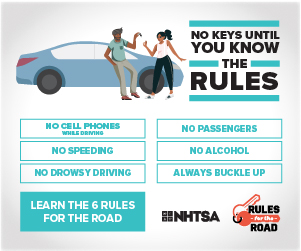
Motor vehicle crashes are the leading cause of death for teens (15-18 years old) in the United States, ahead of all other types of injury, disease, or violence.1 In 2017, there were 2,247 people killed in crashes involving a teen driver, of which 755 deaths were the teen driver.1 April is Distracted Driving Awareness Month. Parents, this is a great time to review the rules of the road with your teen. Talk to your teen about driving laws and the expectations you have for them. If they can’t follow the law, they can’t drive your car.
Be sure to review these safety tips during the month of April:
- Seat belt use- Drivers should always wear a seatbelt and require their passengers to do the same.
- No distractions- Distracted driving isn’t limited to just to cell phone use. Distracted driving can include eating and drinking, navigating the GPS system, changing the radio station and being distracted by the vehicle’s passengers. Encourage your teen to focus on the road and to not attempt to multitask. Taking eyes off the road for as little as five seconds while driving at a speed of 55 miles per hour is the equivalent of driving the length of a football field without looking.
- Speeding- Teens are more likely to be involved in a speeding related crash than an adult due to their driving inexperience. Drivers can receive as little as one and as many as eight points on their license for speeding over the printed speed zone. Teen drivers should be aware that if they’ve accumulated more than six points on their license, they will not be able to receive a Tennessee Intermediate Unrestricted Driver license.
- Limit Passengers- Multiple passengers in the car for an inexperienced teen driver can be incredibly distracting. Graduated Driver Licensing laws limit the number of passengers allowed at one time.
- Cell phone use- Talk to your teen about safe cell phone use while in the car. Encourage them to store away their phones while driving, designate someone to text for you, or to pull over before answering phone calls or responding to text messages. If the driver is under 18, he/she cannot use a wireless device at all, not even with a Bluetooth headset or speaker. This includes talking to a digital assistant like Siri or OK Google. Remember, drivers under the age of 18, cannot make or answer calls while driving (hand-held or hands-free).
- The Tennessee Hands Free Law was enacted on July 1st, 2019 to reduce distracted driving. Public Chapter No. 412 is the official name for the Hands-Free Law. Parents, the Tennessee Hands Free Law applies to you. This law makes it illegal for a driver to hold a cell phone or mobile device with any part of their body. This includes to:
- Write, send, or read any text-based communication which can include instant messages, text messages, email, or internet data on wireless communications.
- Reach for a cellphone or mobile device in a manner that requires the driver to no longer be in a seated driving position or properly restrained by a seat belt.
- Watch a video or movie on a cellphone or mobile device, other than GPS.
- Record or broadcast video on a cellphone or mobile device
- If the driver is 18 years of age or older, he or she may be able to use an earpiece or headphone device.
Parents have the biggest impact on their child’s driving experience. Remember to be a good role model for your teen driver and set an example with your own safe driving habits.
Source:
1. National Highway Traffic Safety Administration
2. Hands Free Tennessee
3. TN Traffic Safety